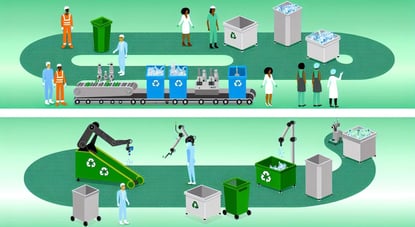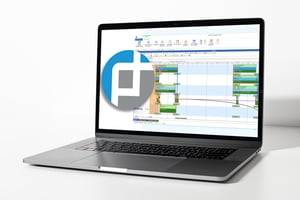Enhancing Sustainable Material Recovery and Recycling Processes
Sustainability has become more than just a buzzword; it's a fundamental aspect of responsible business practices. For production planners in medical manufacturing facilities, integrating sustainable material recovery and recycling processes is not only an ethical imperative but also a strategic move toward operational efficiency and cost savings.
In this blog, we'll explore the critical role of production planners in driving sustainable practices within medical manufacturing, with a focus on enhancing material recovery and recycling processes. We'll also delve into the integration between PlanetTogether, a leading production planning software, and various Enterprise Resource Planning (ERP), Supply Chain Management (SCM), and Manufacturing Execution System (MES) platforms like SAP, Oracle, Microsoft, Kinaxis, and Aveva, to streamline these sustainability efforts.

Sustainable Material Recovery and Recycling Processes
Medical manufacturing facilities generate significant amounts of waste, including packaging materials, production scrap, and expired or defective products. Traditional waste disposal methods, such as landfilling or incineration, not only harm the environment but also represent missed opportunities for resource recovery.
Sustainable material recovery and recycling processes aim to mitigate these negative impacts by:
Reducing Waste Generation: Implementing lean manufacturing principles to minimize waste at the source.
Recycling and Reusing: Establishing efficient systems for sorting, recycling, and repurposing materials within the facility.
Collaborating with Suppliers: Engaging with suppliers to optimize packaging and materials sourcing for recyclability and sustainability.
Compliance and Reporting: Ensuring compliance with regulations and industry standards while transparently reporting on sustainability metrics.

The Role of Production Planners
Production planners play a pivotal role in orchestrating these sustainability initiatives within medical manufacturing facilities. By integrating sustainability considerations into production scheduling and resource allocation decisions, they can drive significant improvements in material recovery and recycling processes.
Here's how production planners can contribute to sustainable material recovery and recycling:
Optimized Production Scheduling: By aligning production schedules with demand forecasts and material availability, production planners can minimize overproduction and reduce the generation of excess inventory and waste.
Resource Allocation: Allocating resources efficiently, including raw materials, energy, and production capacity, helps optimize process efficiency and minimize resource consumption.
Supplier Collaboration: Working closely with suppliers to identify opportunities for waste reduction, material reuse, and sustainable sourcing practices can enhance the overall sustainability of the supply chain.
Continuous Improvement: Implementing continuous improvement initiatives, such as Six Sigma or Kaizen, can uncover opportunities for waste reduction and process optimization throughout the production lifecycle.

Integration with PlanetTogether and ERP/SCM/MES Systems
Effective integration between production planning software like PlanetTogether and ERP, SCM, and MES systems is essential for streamlining sustainable material recovery and recycling processes. These integrations enable seamless data exchange and real-time visibility across various functions, facilitating informed decision-making and proactive management of sustainability initiatives.
For example, integration between PlanetTogether and SAP, Oracle, Microsoft, Kinaxis, or Aveva systems allows production planners to:
Access Accurate Data: Integration ensures that production planners have access to real-time data on inventory levels, material availability, and production schedules, enabling them to make informed decisions that optimize resource utilization and minimize waste.
Automate Processes: Automated data exchange between production planning and ERP/SCM/MES systems streamlines workflows, reducing manual intervention and the risk of errors while improving operational efficiency.
Scenario Planning: Advanced planning capabilities offered by integrated systems enable production planners to perform scenario analysis and simulation, evaluating the impact of different production strategies on sustainability metrics such as waste generation, energy consumption, and carbon footprint.
Track and Report Performance: Integration facilitates the tracking and reporting of sustainability performance metrics, allowing production planners to monitor progress toward sustainability goals and demonstrate compliance with regulatory requirements.
Sustainable material recovery and recycling processes are essential for medical manufacturing facilities looking to minimize environmental impact, optimize resource utilization, and drive long-term profitability. Production planners play a crucial role in orchestrating these sustainability initiatives, leveraging advanced planning tools like PlanetTogether and integrating them with ERP, SCM, and MES systems to streamline operations and improve overall sustainability performance.
By embracing sustainable practices and leveraging technology to integrate production planning with other key business functions, medical manufacturing facilities can achieve their sustainability goals while remaining competitive in an increasingly environmentally-conscious marketplace.
Are you ready to take your manufacturing operations to the next level? Contact us today to learn more about how PlanetTogether can help you achieve your goals and drive success in your industry.























LEAVE A COMMENT